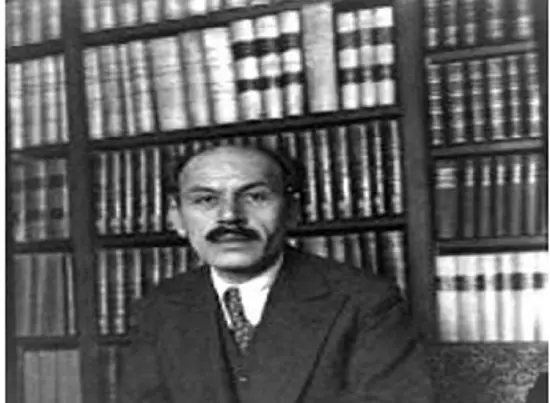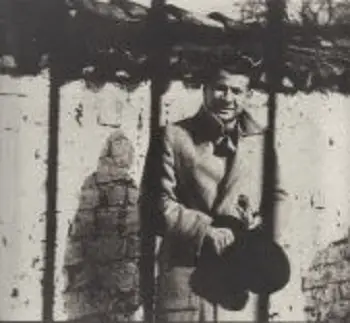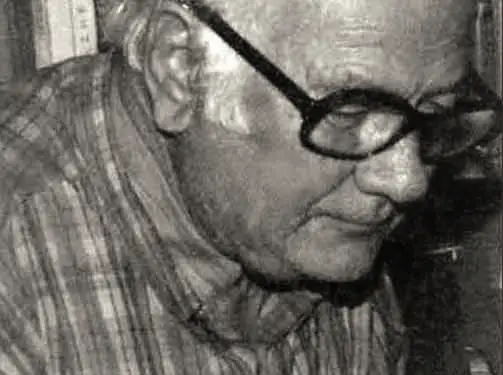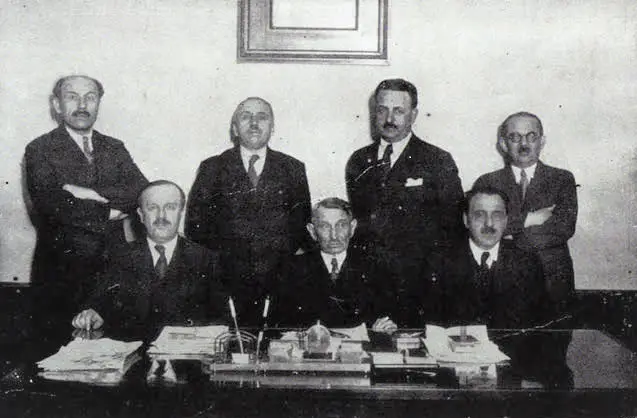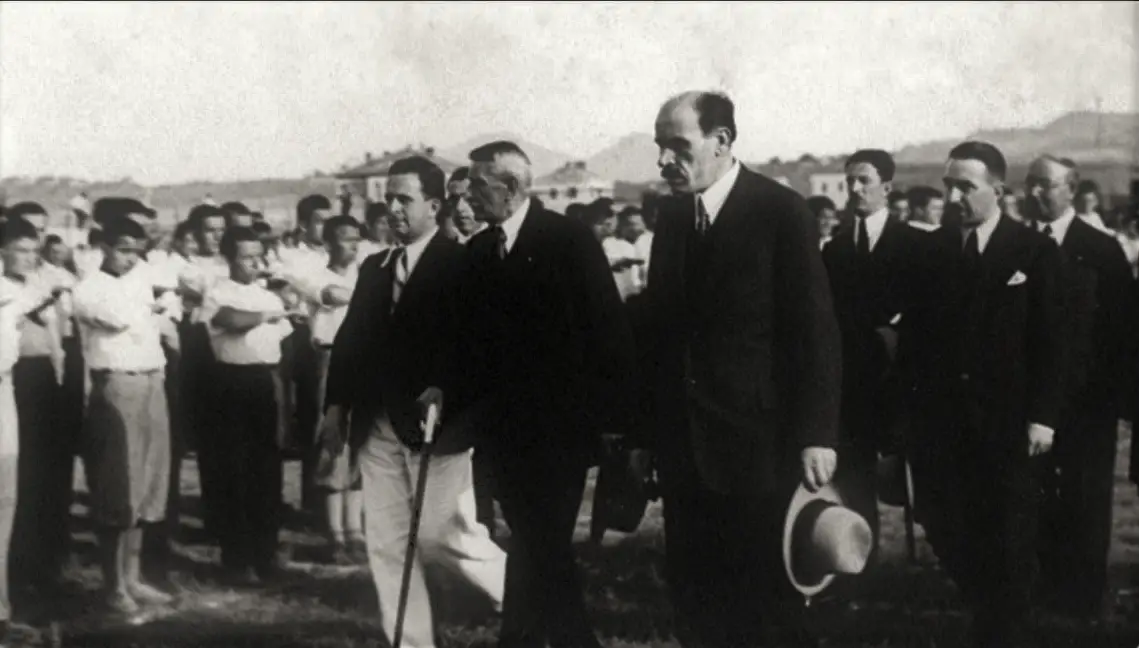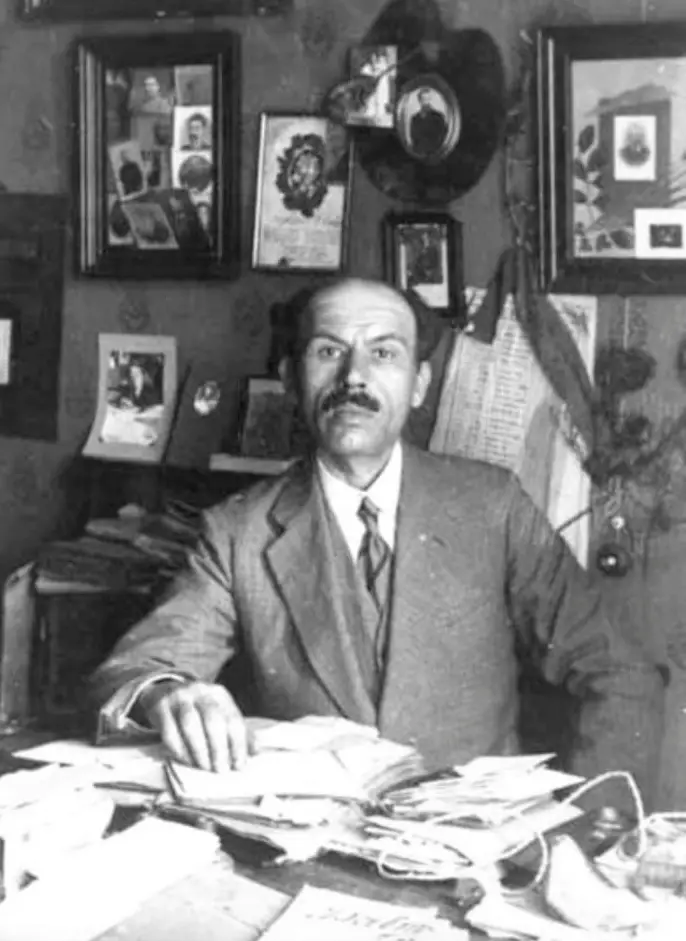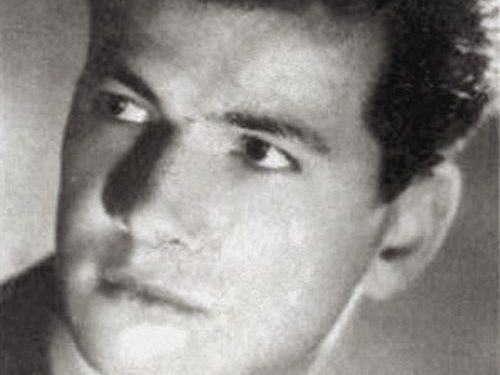By Lazar Radi
Second part
Memorie.al / Lazër Radi was born in Prizren on January 29, 1916, in a family with early origins from Mirdita. He attended primary school and three years of high school in his hometown in the years 1922-1929. At the beginning of the 30s, the Radi family moved from Kosovo and settled first in Tirana and then in Durrës. In 1930, Lazri began his studies at the Tirana high school and in 1931, he was awarded a state scholarship by the Minister of Education, Hilë Mosi, to the Shkodra high school, in the dormitory “Malet Tona. He spent the summer of 1936 at the summer school in Puka, where his sister taught, and there Lazri met the well-known poet, Migjeni. In 1938, he started studying Law at “La Sapienza” University in Rome and in 1942, he graduated with high results in the Philosophy of Law. After graduation, he was invited as an assistant professor in the chair of prof. Vito Cesarini Sforza, however, decided to return to his homeland in 1942, and began his law practice at the Golgota law firm in Durrës. During the period 1942-’44, he worked as a secretary at the office of Housing for foreigners. Contributes for more than a year to the newspaper “Bashkimi i Kombit” under the pseudonym “Ushtima e Sharri”. In 1944, he received his lawyer’s license and began to practice his profession until November 23, 1944, when he was arrested by Enver Hoxha’s partisan forces. After several months of investigation in Tirana prison, he was tried on April 13, 1945, in the “Special Court”, where he was sentenced to 30 years in prison, accused of his involvement in politics through journalism. He served his sentence in the years 1944-1954, in various camps and prisons, (where he shared a cell with Mirash Ivanaj, Petro Marko, Jusuf Vrioni, etc.), where he spent most of his time translating. In 1952, his wife was also arrested (after the bomb incident at the Soviet embassy), who was initially sentenced to ten years in prison and forced labor, but was later reduced to five years after being diagnosed with TB. In 1954, he was released from prison, and less than two weeks later, he was interned first in Savër in Lushnje and then in Shtyllas e Radostine in Fier, then in Kuči i Kurvelesi camp, where he stayed until 1958. In the years 1958-1960, he continued to be interned in the Gradishta and Čerma camps, and in the years 1960-1990, for more than 30 years in a row, he lived with his family in the Savra camp, where he worked as a mechanic, bricklayer, carpenter, ironworker and designer, with the camp painter Lek Pervizin. In 1974, he spent his time in agriculture as a laborer, until he retired on October 8, 1976. In 1982, he was publicly exposed as “Enemy of the people” and dissatisfied with the communist regime, he risked being imprisoned again. In 1990, he returned to Tirana and became active both in politics and with various articles in the press of the time, and by writing books. In 1998, after the exile of his children, the death of his wife on March 21, 1997 and the deterioration of his health, he passed away in Tirana on the morning of September 22. On September 23, the Association of Former Political Prisoners and Persecuted organized a grand funeral. With the events of 1997, he sent the books he had published during this period to his friend in Brussels, Lek Pervizi, with the order to “keep them because communism was being restored in Albania…”! From 2018, the publication of the “Complete Works of Lazër Radi” column began, under the care of his son, Jozef Radi, which includes 15 of his works as an author and 9 translated works, which was completed in 2021 and was promoted at the 2021 Book Fair. The writing we have selected for publication here is taken from his memories of the period of suffering in camps and prisons, as well as what his fellow sufferers have told him. The writing that we have selected for publication here is taken from his memories of the period of suffering in the camps and prisons, as well as what his fellow sufferers have told him.
The next issue follows
– THE LAST YEARS OF MIRAS IVANAJ –
Early days in prison (Ibrahim Hasnai tells)
– I heard the loud groan of Mirash Ivanaj! I have high hopes that the Professor will recover. The authorities are showing great interest. I have the impression that the whole hospital is in motion for him.
– You are completely immature, Agron! As you remember, don’t they do it for the humanitarian spirit that they don’t have? Or are your parents really fond of Professor Ivanj? If they had loved him, they would not have put him in prison for nothing. Now, do you know why they are so interested in prison? I’m saying it! They know that Ivanaj is finished. But they also know something else that he is a well-known name and the world will say that the government strangled Ivanaj in prison. They gave all these orders now in the end to use the hospital as a witness that the government did its best to save him, but it was not possible…!
– These things have never occurred to me!
During this conversation, the door opened and the Professor was brought into the room. As we were settling into bed, we asked the nurse how the test results came out. He answered us between his teeth and none of us understood what he told us. They could clearly see that the Professor was getting worse and worse, his face had turned a deep yellowish brown color, his vision was blurry and very erratic compared to his usual vision.
I remember that there in the translation department, in a free time, Mr. Mirash, Sulejman Dizdari and someone else, whose name I can’t remember, were talking, I didn’t know if I would be able to reproduce the conversation properly. Among other things, the Professor said:
– The eye, in addition to its physiological function, to help man in his daily actions, has several other functions that are also of great importance for his moral life and for his spiritual upliftment. It is precisely this sense, i.e. the eye that first conveys every perception of the human soul: through it passes the beautiful and the ugly, the good and the bad. Through the eye we see all the wonders and beauties of nature and life, we see the majesty of the gods and the wonder of dawns. Without eyes, human life would be poor and miserable…!
… At 7 o’clock in the evening, nurse Njaziu came and applied the serum. He instructed me to take care of him and report any possible complications to the command. I stood at the top. The professor did not utter a single word. Often times, with his hand, he caressed mine and it seemed as if with that movement he was expressing his gratitude. During this time our dinner came. They went to the bathroom and when we entered the room the guard locked the door from the outside. According to the rules, at night, for no reason, the door was not opened. Yes, where he had made a request, he was expected at midnight and only at that hour, for a few moments…! In the entire prisoner’s hospital, in the evening hours, a complete calmness reigned.
Ndou and I also lay down on the bed and without saying a word we sank into our thoughts and worries. During the day I seem to have made excessive movements and started to feel pain in the surgical wound. There in the late hours of the night I was looking at the professor calling me dumb and making hand signs. I get up. He asked me to take him to the bathroom because he needed it. After much effort, the guard finally came but never opened the gate. After I told him the Professor’s situation, he told us that according to the regulations, the gate is not opened at night and every need, big or small, had to be done in the container left by the apostates for this work.
With Ndou’s help, we lifted the Professor and placed him on the couch. With great difficulty he could pour only a few drops of urine. It seems that there was some defect in the urinary tract. After a lot of effort, and of course after a lot of pain, the job was done. We watched him tighten so much that the veins on his forehead came out, but not a single moan or a sound was heard from his mouth. We made him comfortable again in bed. As if he calmed down a bit! We also took a seat in our beds. We fell asleep…!
…All three of us fell into a sweet sleep, like the sleep of early autumn. We would have continued this carefree sleep for who knows how long if a banging of the open door had not startled us. He was the inner guard, arrogant and uncared for, who didn’t want to know about the sick or people who were dying. The slamming of the door was accompanied by a scream:
– Come on, quickly to the emergency room… quickly… quickly…!
Even though there was all that noise around, sleep was not about to leave me. Ndou came to my bed and playing with my hand said:
– Hurry up, they are closing the door!
I got up and went straight to the professor’s bed. He was awake: who wouldn’t be awake after all that noise? He was unable to move even though he really needed to. I tried to help him up. The weakness of the body had reached its peak. He was not even able to stand on his own feet…! A few drops of urine and nothing else. After I made him comfortable in his bed, I asked him:
– Professor, how do you feel? – The same, today I have fainting spells and I want to vomit! The professor was in the grip of life… but, between today and tomorrow, five or six days passed! This morning the seventh day began. The professor showed no signs of improvement. It seemed to us as if he had been brought to the infirmary of the hospital to fight for his life and after a few days succumb to death.
Breakfast came for us: compote, marmalade and bread. Along with the breakfast, we also got the good news that in an hour, Ndou had to get ready to be transferred to the Dispensary. The joy lived only for a moment; he was very upset that he was leaving the Professor and me alone. For those days we spent together, we became friends and brothers.
I approached the Professor and with the compote and the spoon in my hand I was begging him to put something in his mouth. During all those days we spent together in the infirmary, he put nothing in his stomach but a little thin yogurt and a little compost juice. His spirit was maintained with insulin. He stayed alive only thanks to the serums administered to him. I begged him, I begged him to take at least some juice…! Nothing. With a thick voice and giving signs with his hand, he told me: – I can’t eat anything! I have no appetite at all!
Meanwhile, Ndou got ready, and when the guards came to take him, he got up and came to the Professor, bowed to his head and kissed him on the forehead. Surprise! The professor reacted immediately! He was physically down to earth but his mind worked brilliantly. He could raise one hand and put it on Ndou’s head and in a weak voice and indistinct words from his thick tongue, he said:
– You will be better at the Dispensary than here! You are young: you must heal and live! Don’t worry about me! I have eaten my meadow.
In his severe, pale, wrinkled face and in his drooping eyes a little liquid seemed to rush, which could be considered tears, as an expression of pain being shared by a fellow sufferer. It seems that in those moments of separation it was slipping through their minds that that greeting could be the last farewell they were giving each other. This is the only way to explain that sad moment that was not allowing them to separate their heads from each other…!
…At lunch, I informed the health department that the Professor’s health condition was getting worse and worse. Doctors should have been notified! I tried to feed him some yogurt! It gave me signs that my stomach was not accepting anything. After my insistence, he accepted by counting only three spoons of yogurt! He returned the fourth. Then, I turned on my back. His eyes, frighteningly, were half-open.
His face looked frozen. Some water bubbles appeared on the forehead: they were cold sweats…! Not a muscle moved. It wasn’t long before he began to show signs of discomfort. This concern seemed a little in the movement of the head and a little in the movement of the hands. I saw that he had a stomach ache and was about to vomit. After all, the professor who didn’t want to eat was right! I took a towel and brought it to his mouth saying:
– Take it out Professor; what do you have to take out!
Then I put him back in my arms and I was waiting for him with the towel: he only took out the three spoons of yogurt that I gave him at lunch. From his breath, he sprayed a little on his mustache and face. I wiped it and cleaned it with the towel I had in hand. I wet the towel in a corner and ran it over my face. I also combed her hair, adjusted her covers and I had the impression that she calmed down. Now I could sit down and eat lunch. I lay on the bed and I don’t know where my mind was flying, when I hear the call of the Professor. I get up faster…!
– I’m sorry Goni, because I castigated you!
– Not at all, Professor, if you recover, you have everything.
– I’m done! There is a poem under the pillow here. Someone gave it to me. I have kept it very carefully. If you can take it from here and if you find the opportunity, publish it. It is simple but has human values…!
As if it took a little too long with this order. He spoke longingly and very excited. To please him I said:
– I will get him out for sure if I get out of this prison alive. I will learn it by heart! I began to recite it to him, as I knew how! He made an incredible effort, grabbed my hand and squeezed it tightly. I had never seen a man in his last moments of life. That handshake seemed to me as if he asked for help to get his soul out as soon as possible. Then he let go of both hands.
The Professor’s heart stopped beating!
I called him three or four times. Silence! Then I fell on his body covering him with my tears. I didn’t see my father either when they killed him or when they buried him (if they buried him). In this case, both my father and the Professor were crying. When I came to, I noticed that I had forgotten to close my eyes.
I will never forget those shocking moments.
How long did this condition last? Maybe a few moments. Maybe a few hours? I don’t know anything! I only remember that the door was opened and nurse Niaziu was brought into the room. Seeing me in tears, he immediately knew that everything was over.
I was surprised he didn’t show any concern! As if a dog had died! He showed no remorse! As a nurse of a large hospital, who knows how many such cases he has seen with his own eyes? Without saying a word, he went out and bolted the door. It didn’t take long and he came with the two prison guards and the doctor on duty. They loaded him on a wheelchair, covered him with a sheet and crossed the threshold.
The guard closed the door and bolted it. The Latin says: “Sie transit gloria mundi” (Thus passes away the glory of this world). Where they took him, what they did with him, where they buried him: I don’t know anything! Even if they had left me dead that night, it would have been a great kindness for me.
On my bed, lying on my back, with both hands tied behind the headboard, while I was replaying those last moments of the professor’s life, I began to wonder even to myself: how did he did so suddenly? How did it slip out of my hand like a rebel bird? Where did he fly, to the sky or to the forest…?! Memorie.al




